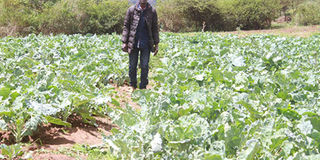Ex-sand boys reap huge farm profits

Julius Muli, who once depended on sand harvesting to cater for his livelihood, poses in the farm in Makueni where he now cultivates vegetables. The sand business ended when the community realised that it was destroying natural resources such as rivers and putting hundreds of lives at risk. PHOTO | PIUS MAUNDU | NMG
What you need to know:
- This has been Mr Kaunda’s business for the past two years following the recovery of the seasonal river which had been destroyed by sand harvesting.
- Mr Kaunda waters the crop twice a week. The enterprise is not labour intensive because the holes are designed to ensure as little water as possible is wasted.
- Mr Kaunda says the enhanced income has enabled him educate his first born to college and to acquire a six-acre piece near Machinery township in Kibwezi East Constituency, where he is planning to move his entire family.
- Makueni County Sand Conservation and Utilisation Authority MD Halinishi Yusuf singles out the building of sand dams and the involvement of communities as some of the strategies the devolved unit used in addressing the menace.
A cloud of anxiety hangs over Ukambani as residents grudgingly brave an extended dry spell while staring at famine.
Mr Francis Kaunda, who grows vegetables at his Enguli village land in Makueni County, is among a handful of locals not worried.
We found the father of six busy at the one-acre farm on the Kasikeu-Musaani road.
“We mainly grow vegetables and the farming is throughout the year,” Mr Kaunda, a messenger at Musaani Secondary School, told Seeds of Gold while watering his tomato and sukuma wiki plots.
The water is pumped from a well at the bed of River Enguli using a diesel-powered generator. It is channelled directly to the roots of the crops using a pipe.
This has been Mr Kaunda’s business for the past two years following the recovery of the seasonal river which had been destroyed by sand harvesting.
Work on the farm starts with the preparation of the seedbed and the nurseries.
Seedbed preparation entails digging multiple six-feet deep holes in the plots.
The holes are spaced half an inch apart and the rows are one foot apart to maximise space.
“We transplant the seedlings into the shallow pits after one month at the nurseries,” the 48-year-old says.
Mr Kaunda waters the crop twice a week. The enterprise is not labour intensive because the holes are designed to ensure as little water as possible is wasted.
At times, Mr Kaunda puts a section of the plot to maize, which he harvests while green and sells the stalks to livestock farmers.
The small farm is managed in such a way that it produces maize or vegetables at any one point of the year.
The farmer says the outcome has been impressive. When he is not tending the farm, Mr Kaunda is handling tens of his neighbours and vegetable traders from Musaani, Kasikeu and Sultan Hamud towns who arrive in the morning and evenings to buy the produce.
“In a ‘bad’ month, I make Sh100,000 from the farm,” he says.
PROVIDE WATER
Mr Kaunda says the enhanced income has enabled him educate his first born to college and to acquire a six-acre piece near Machinery township in Kibwezi East Constituency, where he is planning to move his entire family.
He regrets the years and resources locals have wasted in the sand business.
Until two years ago, the river bed where Mr Kaunda’s well sits was a hotbed of deadly fights between sand harvesters and their local collaborators on one side and the community, police officers and conservationists on the other.
So bad were the conflicts that a police officer was killed at Mangala market — a stone’s throw away from River Enguli — by a group attackers.
“I would receive Sh1,000 for every 10-tonne sand carrying truck from the section of the river that cuts through my farm,” Mr Kaunda says.
“The sand business ended when the community realised that it was destroying the river and putting hundreds of lives at risk.”
In 2015, the Makueni County government enacted the Sand Conservation and Utilisation Act to regulate the industry.
The law created the Makueni Sand Conservation and Utilisation Authority, an agency tasked with ending the harvesting of sand and the restoration of rivers.
The efforts have made the environment a major devolved government agenda and have complemented conservation efforts by individuals, non-governmental organisations, and the Water Resources Authority.
Makueni County Sand Conservation and Utilisation Authority MD Halinishi Yusuf singles out the building of sand dams and the involvement of communities as some of the strategies the devolved unit used in addressing the menace.
“The authority works closely with communities to identify appropriate points in the affected rivers where to install dams,” she says.
“The dams provide water for the communities. They also make it difficult for trucks to move in river beds.”
Some farmers have devised ways of ensuring the water trapped in the dams lasts long.
Mr Julius Muli, who runs a successful agribusiness venture, falls in this class.
Mr Muli grows French beans, onions, sukuma wiki, cabbages and maize on Zai pits installed across his six-acre farm on the fringes of Wautu market.
Just like Mr Kaunda, Mr Muli took up micro-irrigation farming two years ago when he dropped sand harvesting.




